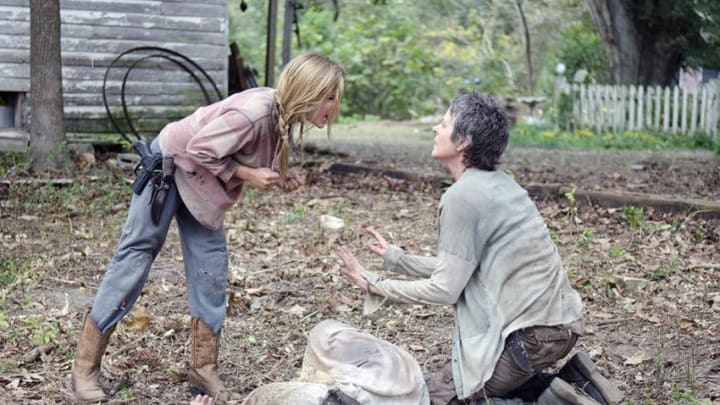The Walking Dead was always a bleak show, but “The Grove” took us to an especially dark terrain of child murderers and walker supremacy.
There’s no simple way to explain episode 414 of The Walking Dead. Even when you have a solid sense of what happened and why, putting “The Grove” into words seems elusive.
To begin with, the bleak storyline involves the death of children, which is instantly more than some can take. Still, The Walking Dead crafted a unique problem with the character of Lizzie. She technically was not a monster when she killed her sister. In fact, she probably meant well. The point is, she was too far gone, too lost in her unique interpretation of what walkers are. In a sense, she’s like a walker supremacist, seeing them merely as a natural, inevitable development of people after they die. Technically she may have been correct about that, but had a bizarre and ultimately deadly interpretation of what that means.
Underneath the shock of the episode is a serious question: If the world of The Walking Dead were approximated in real life, how would it change how people perceived life and death? Perhaps Lizzie sees it differently than you or I, but it’s conceivable that views like hers would come into fruition. Why not regard the undead as a superior form, especially when normal humans aren’t necessarily morally above tearing each other to pieces? What is there to really say they are inferior and we’re superior?
In fact, oddly enough, her truth could be applicable now to the world around us. While we may reasonably bemoan this evil person or that, how wide is the degree of separation between “us and them”?
Lizzie chose a side
Just about every society on earth has some evil in its history, so moral absolutism can’t be the sole ground we all stand on. To some extent, there has to be some degree of subjectivity, right?

We ultimately pick the side we like best, based on what experiences we have and how we feel “our side” will protect us. Some of us simply align with tradition, because it seems right to not challenge assumptions.
In that sense, Lizzie may be a very misguided independent thinker. She just happens to view the dead as the more desirable side. Sure, it’s easy to see her as crazy or a turncoat, but there is still something to her warped views.
To this day, Lizzie Samuels is one of the most memorable characters of the entire series, suggesting that a divergent world creates divergent perceptions.
Morals are optional
The Walking Dead presupposes a rather different world. It may not be devoid of morals, but there are way more hurdles to them than one could easily leap. In fact, survival practically depends on one’s ability to shift moral sensibilities around. For another example, Carol and Tyreese come to terms not only with the shooting of Lizzie — the iconic “Look at the flowers” scene — but Carol’s murder of Karen and David back at the prison. Tyreese forgives her, declining her offer to appease his vengeance.
While Tyreese is a moral character, it may be partly because he just couldn’t cope with any more killing. It’s also true that, had he done it, he would have needed to care for baby Judith alone. Keeping Carol likely increased Judith’s survival odds (and presumably his own). As the two set out for Terminus, they faced an uncertain future. Then again, when was anything ever certain?
What are your thoughts on The Grove and The Walking Dead? Could you admire flowers the same as before? Let us know in the comments!
